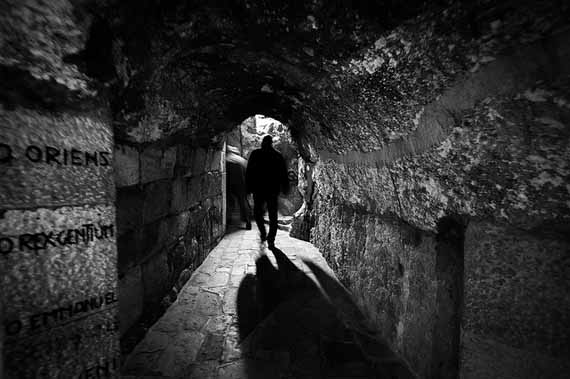
The interviewee has asked us not to use his name or photo in fear of persecution. He is not depicted in the image above. –The Eds.
Where are you from? I was born in and raised in Bethlehem, the birthplace of Christ. I still live here.
How old are you? 30.
What spiritual tradition were you raised in? I grew up as a Christian and received a bachelor’s degree in theology and Bible studies from Bethlehem Bible University. I taught Sunday school at the church here for one year and then taught Bible studies there for four years.
What was your path to the dharma? How did you first get interested in it? I came to the dharma through research and studies in religions. Buddha and Jesus Christ have some similar teachings about love, peace, and purity, but when we look at the Old Testament we can see how God asked his people to kill others to obtain land. And we can also see violence in the Quran. So this led me to search for other truths and through that I began to study Buddhism. Then I saw the movie The Life of Buddha and I began to search and study more about the Buddha, Buddhist history, and Buddhist philosophy.
What kind of access to the dharma is there in Bethlehem? All of my studies are from the Internet; the first Buddhist text I ever read online was about karma. I don’t have any books.
Unfortunately, what’s available about Buddhism in Bethlehem is unreliable, because there is a lack of teachers and monks here. Some teachers come to Tel Aviv or the Galilee but I am not allowed to go because I am Palestinian. How can we hear the teachings without a teacher? It’s not easy for people to find the dharma.
Do you want to stay there? Do you have a vision of where your study might lead? I want to be ordained as a monk and stay in Palestine as a Buddhist teacher to spread the teachings of the Buddha. We Buddhists have the responsibility to spread these teachings and allow people a way to get to know the truth, and not just from what they hear from other Muslims and Christians who often tarnish the image of Buddhism.
What’s it like there for spiritual seekers? To be a Buddhist in Bethlehem is something very unusual. Because a lot of people here do not have any knowledge of Buddhism, they all look at me in a different way.
Which spiritual guides or teachers inspire you? Do any come to Bethlehem? I don’t think any Buddhist teachers have come here, so there are none to inspire me.
What do your family and friends think about your pursuits? At first I faced problems and some persecution but when I explained and showed what I knew of the teachings they accepted my thoughts. But I lost some friends and my job as well.
What dharma books do you like to read? It is very hard for me to find books. I read mostly e-books online, in English. In particular, I’ve read Geshe Kelsang’s How to Solve Our Human Problems and Dzongsar Khyentse Rinpoche’s What Makes You Not a Buddhist. I think we must offer Arabic translations of these books, for people who have newly come to Buddhism. I want to help translate but I can’t do it alone—I need to work with a professional translator.
What are your aspirations? Dreams? My dream is to share the teachings of Buddhism: love, tolerance, generosity, and nonattachment to riches and luxury. And ultimately I would like to build a Center for Buddhist Studies and a youth center in Palestine to promote the love of Buddhism to others.
I hope that this interview can show the importance of working in the Arab countries. In war there is rape and stealing, which some people consider their right, as the so-called “spoils of war.” This causes human suffering, as we can see today in Gaza, Syria, and Iraq. But the teachings of the Buddha discourage this type of behavior, so we must work here more. We have encountered problems because the community sees Buddhism as a wrong religion.
Do you think there can be peace in the Middle East? Peace comes from inside. If people change from inside, there can be peace.
—Noa Jones
Thank you for subscribing to Tricycle! As a nonprofit, we depend on readers like you to keep Buddhist teachings and practices widely available.